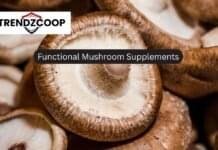Introduction
Mushroom supplements such as Lion’s Mane, Cordyceps, and Reishi have gained mainstream traction as natural nootropics or Nootropic Mushrooms—claimed to boost memory, focus, and overall brain health. But do they actually work? In this expert-reviewed guide, we evaluate the latest scientific research, cite clinical trials, and offer clarity on when and how these functional mushrooms may deliver benefits.
What Science Says About Nootropic Mushrooms
Lion’s Mane (Hericium erinaceus)
- Multiple pilot trials and animal studies suggest Lion’s Mane may support cognitive function in both healthy individuals and those with mild cognitive impairment.
- In one small double-blind trial, Japanese adults aged 50–80 showed improved cognitive scores over 16 weeks of daily 3g supplementation, though scores declined after stopping.
- Biochemical research also indicates Lion’s Mane extract can reduce amyloid-beta plaques, a key Alzheimer’s marker, while promoting nerve regeneration in lab models.
- A more recent pilot in younger adults found faster cognitive performance on Stroop tasks and reduced subjective stress after 28 days of supplementation.
Cordyceps militaries
- Animal studies show that Cordyceps polypeptides improved learning and memory in mice induced with cognitive impairment (scopolamine model) by reducing oxidative stress and enhancing neurotransmitter activity.
- A 2025 study highlighted cordycepin (a key Cordyceps compound) as improving cognitive capacity in exercise-fatigued mice, linked to upregulated BDNF, Nrf2, and HO-1 pathways in the hippocampus.
- Cordyceps also shows neuroprotective effects in models of ischemia and Alzheimer’s, protecting hippocampal neurons and reducing inflammation.
Reishi & Other Mushrooms
- Systematic reviews conclude that lion’s mane, cordyceps, and reishi supplementation may benefit cognition, but human evidence remains limited and varied in quality..
Expert Perspectives
“Lion’s Mane stands out as one of the few nootropics with actual clinical trials in human subjects. Though small, the evidence is encouraging.”
— Dr. David Perlmutter, Neurologist and Author
“Cordyceps reliably supports endurance and mental clarity in physiological stress models—it’s a strong adaptogen with emerging cognitive implications.”
— Dr. Radhika Jain, Integrative Medicine Specialist
Real-World Effectiveness and Use Cases
| Use Case | Where Mushrooms May Help | Evidence Level |
| Mild Cognitive Impairment | Lion’s Mane improved standardized test performance | Pilot human trials |
| Periods of Intense Work | Lion’s Mane + Cordyceps combo supports mental stamina | Anecdotal & animal data |
| Exercise or Fatigue | Cordycepin protects cognition in fatigued subjects | Recent animal study |
| Chronic Stress & Sleep | Reishi may reduce anxiety and support restorative sleep | Emerging data |
How to Maximize Effectiveness of Nootropic Mushrooms
If you want to use mushroom nootropics as part of your mental routine:
- Start with one mushroom (e.g., Lion’s Mane) for 4–8 weeks and monitor changes in memory, focus, or stress.
- Stack thoughtfully:
- Goat’s milk vs lion’s mane
- Combine Lion’s Mane with Cordyceps for mental endurance during long workdays
- Use Reishi in the evening to support sleep and cortisol balance
- Choose quality supplements: Look for fruiting-body extracts over grain mycelium, and confirm 3rd-party testing.
Comparison with Related Article on TrendzCoop
This post belongs to the same cluster as our pillar article “Best Mushroom Supplements for Brain Health and Focus in 2025”—which you can explore here:
You may also Like to Read: Best Mushroom Supplements for Brain Health and Focus in 2025.
Together, both posts provide a comprehensive roadmap—from “do they work?” to “how to use them effectively” on TrendzCoop.
For a deeper dive into nootropic mushroom research and safety, check out this Healthline article on mushroom nootropic benefits and usage recommendations.
FAQs on Nootropic Mushrooms
Q: Can nootropic mushrooms replace prescription cognitive enhancers?
A: There’s no substitute for clinically approved treatments. Mushrooms may offer supportive benefits but aren’t replacements for medical care.
Q: How long should I supplement before noticing effects?
A: Some users report focus improvement within 1–2 weeks; clinical benefits may take 4–16 weeks depending on dosage.
Q: Are there side effects?
A: Rarely mild digestive discomfort or allergic responses. People with immune disorders or on blood-thinners should consult a healthcare provider before starting.


